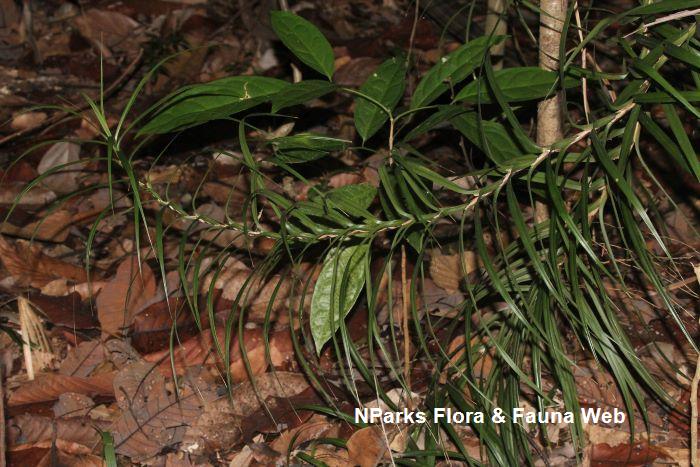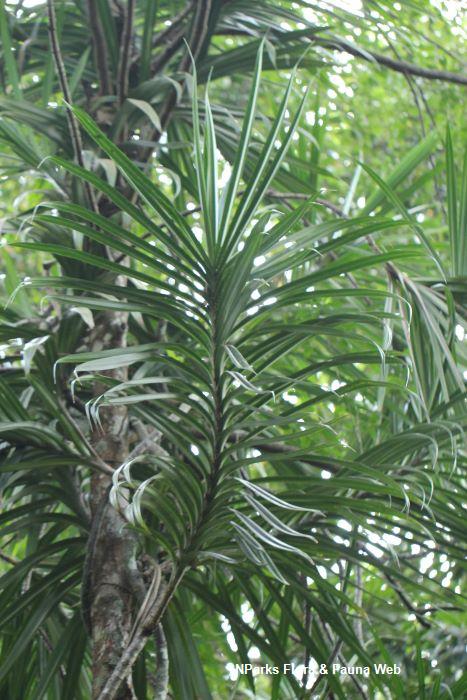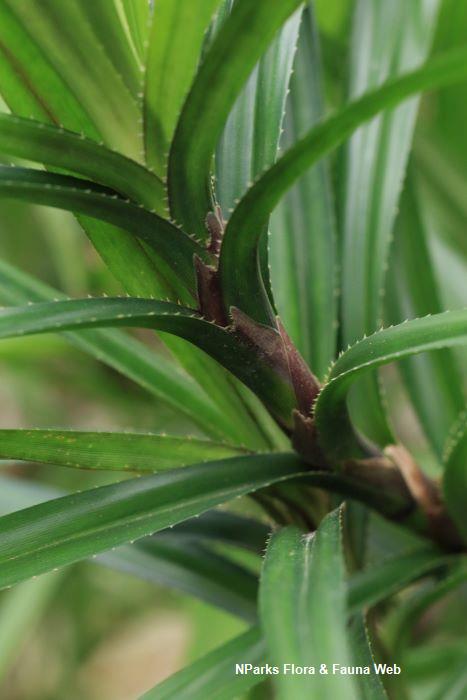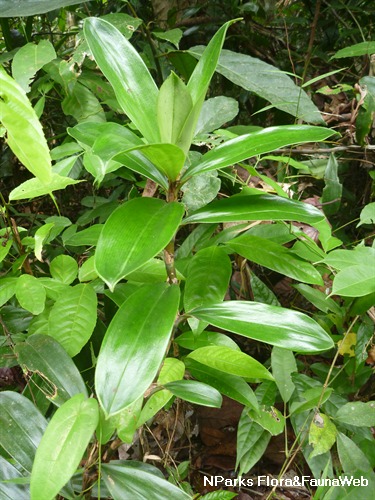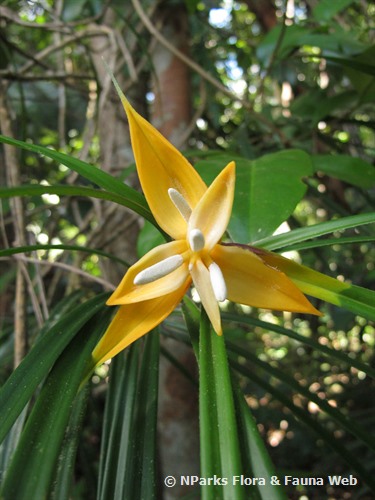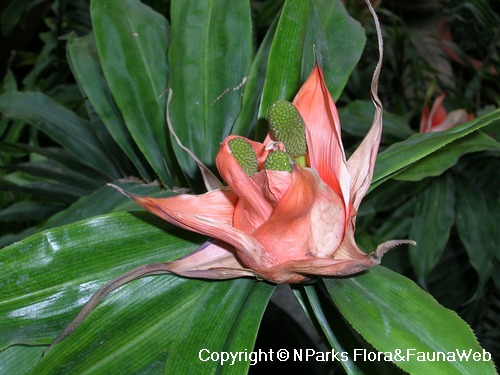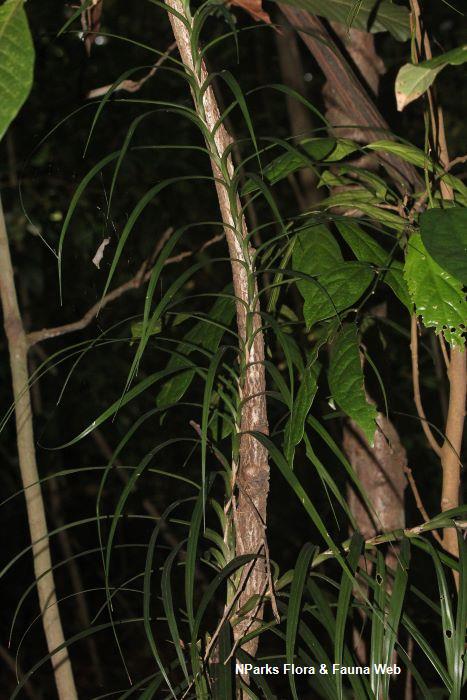
Back
Freycinetia sumatrana Hemsl.
| Family Name: | Pandanaceae |
| Synonyms: | Freycinetia valida Ridl., Freycinetia auriculata Merrill, Freycinetia lucida Martelli, Freycinetia ceramensis Martelli, Freycinetia amboinensis Martelli, Freycinetia sumatrana var. penangiana B.C.Stone |
| Common Name: | Rajak |
Freycinetia sumatrana is a native robust climber with spiny, lanceolated leaves arranged in tree ranks. This species is the most common among the five native species in Singapore.
Name
Classifications and Characteristics
| Plant Division | Angiosperms (Flowering Seed Plants) (Monocotyledon) |
|---|---|
| Plant Growth Form | Climber, Herbaceous Plant |
| Lifespan (in Singapore) | Perennial |
| Mode of Nutrition | Autotrophic |
Biogeography
| Native Distribution | Andaman Islands, Peninsular Malaysia, Singapore, Sumatra, Java, Borneo, the Philippines, and Moluccas |
|---|---|
| Native Habitat | Terrestrial (Primary Rainforest, Freshwater Swamp Forest) |
| Preferred Climate Zone | Tropical |
| Local Conservation Status | Native to Singapore (Vulnerable (VU)) |
Description and Ethnobotany
| Growth Form | It is a robust, perennial climber that may reach 20 m high, with occasional branching along the main stem. |
|---|---|
| Roots | The clasping, adventitious roots sprout from the nodes and provide support as the plant climbs on vertical surfaces. |
| Foliage | The leaves are long, smooth, lance-shaped, growing up to 60-125 cm long and 3.5 cm wide with spiny margins. The leaves are arranged in three ranks. Each leaf has a lobed auricle (membranous projection of the leaf sheath) on each side of the leaf base. Flowering shoots will produce creamy bracts. |
| Flowers | The inflorescence is a spike (also known as a spadix or a cephalia) on a peduncle, usually in 3-4 on the tip of a leafy shoot and subtended by creamy to white bracts. The spike can be 15 cm long and 4cm wide, made of highly reduced, off-white flowers with either stamens or pistils. Plants are dioecious (individual plants producing either male or female inflorescences). Flowering specimens are hardly observed in lowland. |
| Fruit | The infructescence resembles the female inflorescence. The fruit is a slender berry that turns red when it ripens. |
| Habitat | It can be found in lowland tropical rainforests up to 1820 m above sea level. |
| Taxonomy | This species is the most common among the five native Freycinetia species; the others are F. angustifolia, F. confusa, F. corneri and F. javanica. |
| Cultivation | It requires a tree trunk or any similar support to climb. |
| Etymology | The generic epithet Freycinetia commemorates Admiral Freycinet (1779–1842), a French circumnavigator. The specific epithet sumatrana refers to the type locality in Sumatra. |
| Ethnobotanical Uses | Others: Leaves are used for baskets, mats and handicrafts. |
Landscaping Features
| Desirable Plant Features | Ornamental Form |
|---|---|
| Landscape Uses | General, Parks & Gardens |
| Thematic Landscaping | Naturalistic Garden |
| Usage Hazard - Cons | Spines/Thorns - Leaf |
| Usage Hazard - Cons Remarks | The leaf margins are lined with recurved spines. |
Plant Care and Propagation
| Light Preference | Full Sun, Semi-Shade |
|---|---|
| Water Preference | Moderate Water |
| Plant Growth Rate | Moderate |
| Propagation Method | Stem Cutting |
Foliar
| Foliage Retention | Evergreen |
|---|---|
| Mature Foliage Colour(s) | Green |
| Mature Foliage Texture(s) | Smooth |
| Foliar Modification | Spine (marginal) |
| Foliar Type | Simple / Unifoliate |
| Foliar Arrangement Along Stem | Spiral |
| Foliar Attachment to Stem | Sessile |
| Foliar Shape(s) | Non-Palm Foliage (Linear, Lanceolate) |
| Foliar Venation | Parallel |
| Foliar Margin | Denticulate, Spiny |
| Foliar Apex - Tip | Acuminate |
| Foliar Base | Clasping |
| Typical Foliar Area | Mesophyll ( 45cm2 - 182.25 cm2 ) |
| Leaf Area Index (LAI) for Green Plot Ratio | 3.5 (Shrub & Groundcover - Monocot) |
Non - Foliar and Storage
| Stem Type & Modification | Herbaceous |
|---|---|
| Root Type | Aboveground (Aerial Root), Underground (Fibrous Root) |
Floral (Angiosperm)
| Flower & Plant Sexuality | Unisexual Flowers , Dioecious |
| Flower Colour(s) | Cream / Off-White |
|---|
| Flower Grouping | Cluster / Inflorescence |
| Flower Location | Terminal |
| Inflorescence Type | Spike |
| Ovary Position | Superior / Hypogynous |
| Flowering Habit | Polycarpic |
References
| References | <1> Keim, A.P., Rustiami, R. & Rustiami, H. (2011). The Pandanaceae of the Bukit Baka Bukit Raya National Park and adjacent areas, West and Central Kalimantan, Indonesia, with notes on their nomenclature and the rediscovery of Pandanus aristatus and several new records. Gard. Bull. Singapore 63(1 & 2): 31–62. <2> Stone, B.C. (1970). Materials for a monograph of Freycinetia Gaud. (Pandanaceae). V. Singapore, Malaya, and Thailand. Gard. Bull. Singapore 25(2): 189–207. |
|---|
Image Repository
Others
| Master ID | 30696 |
|---|---|
| Species ID | 5008 |
| Flora Disclaimer | The information in this website has been compiled from reliable sources, such as reference works on medicinal plants. It is not a substitute for medical advice or treatment and NParks does not purport to provide any medical advice. Readers should always consult his/her physician before using or consuming a plant for medicinal purposes. |

